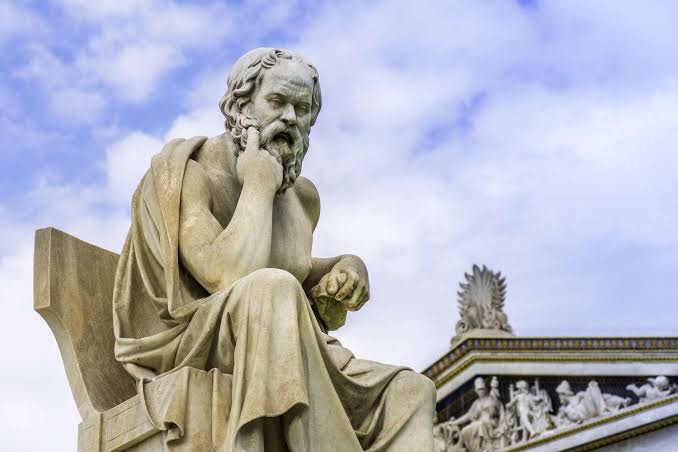INTRODUCTION
A sculptor who was delving into the metaphysical dimensions and not merely the material seclusions unlike the normal humans of his time, he rose to the occasion of questioning, not taking things to blind faith, not disseminating the premeditated biases, and living a life of prejudiced choices based on the teachings divulged by his peers and acquaintances. Socrates, a major thunderbolt in the field of philosophy– a teacher of Plato and an enemy of dictators. He met his ugly fate of death, but before that, he shared an invaluable lesson with us- of how we can become “rational agents” in this mundane existence. He dispensed a golden verbatim that became the guiding light for establishing the moral code and conduct of who is ethical and how one can act ethically and play by conscience. He gave the immortal gospel of truth: “An unexamined is not worth living”. Let us understand this aspect in depth. 
THE EXPOSITION
Imagine a life where a man is simply living, eating, sleeping and playing by the rules- he is living, as per the normal standard only, a life which is just like a straight line. With every tender step ahead in life, he is just growing older and ending up having relatively lesser time in his hands. He starts to think that what has he done with his life- with his own self and what will he leave for his family after the demise- what is that, which will actually help his family? Is it just the money- for it is an extinguishable resource, is it the house and other associated properties for they are just bricks and puddles of muck which will decay. These questions, these frightening lines and dawning, these distortions are only engulfing the man in more deeper and inescapable questions which fills him with deep sorrow and he starts to nurture anguish and angst- full of ire, his time on earth ultimately ends. He thinks life would have taken a different turn had he retrospect his actions and outcomes of his life in his youth.
Supposedly, let us take another example- a man who has a family, is working 24*7, playing by the corporate rules and living quite a monotonous life- he ends up chasing a goal, objective and aims to target his stakes of life at the goal only. He becomes like a machine- an object who works and moves his hands in all the directions solely because he has a family to take care of and is also juggling his work obligations with his family-related duties. He grows and questions his life, his existence, more appropriately, he questions his role which was nothing more than a machine. It only fills him with regrets and uncountable remorseful imaginations. Why did I bring this thing in the first place? It is primarily because of the fact that, great philosopher is trying to make us aware about the value of examining choices, life in general. He is trying to call our conscience- to act consciously- attend to the call of duty and not to lie dormant.
The philosophy of “The dictum is recorded in Plato’s Apology (38a5–6) as ho dè anexétastos bíos ou biōtòs anthrṓpōi (ὁ δὲ ἀνεξέταστος βίος οὐ βιωτὸς ἀνθρώπῳ)“ explains a source and Socrates is trying to bring our attention towards this aspect that we have to necessarily lean towards critically examining and rationally evaluating our life outcomes, consequences of our actions and not to remain like a blind machine which only move their hands in all the directions to satisfy their slavish requirements with being oblivious towards the existence of others in his/ her significant surroundings because, as per a source perfectly puts it: “Socrates argued that a person who lives a routine, mundane life of going to work and enjoying their leisure without reflecting on their values or life purpose had a life that wasn’t worth living.” To rationally indulge in the examination and evaluation of our life, habits and actions is what Socrates and much before this Greek philanthropist, Shree Krishna taught this to Arjuna as well in the battleground of Mahabharata. Socrates is compelling to look onto this aspect that if we give up on thinking upon our actions- living mundane dull witted life of no introspection and singularly chasing our dreams in the most sluggish way possible- then we are not only giving up on the opportunity and advancements our thoughts could possibly shower upon our actions, the relative protection from the harm, we are also living like an animal, or in a vegetative state, which is defined as the state when the brain is completely dead and what exists is the body of a human being, but with a non-functioning brain- which is the seat of all of our memories, experiences and knowledge.
CONCLUDING VERSES
“His “examination” of life in this way spilled out into the lives of others, such that they began their own “examination” of life, but he knew they would all die one day, as saying that a life without philosophy – an “unexamined” life – was not worth living.” It is remarked by Plato that: “Not life, but a good life, is to be chiefly valued” and we can conclude effectively that this process could only see the bright color of the sunlight if we examine each and every aspect of the lives we are currently living. Retrospect, introspect and thinking could be the boat which will help human beings to successfully sail through the harsh ravages of the time. If we end up not putting our brains to work, and start living like an animal, we are probably in a vegetative state or equally dead. How can we then possibly say that we qualify to be the “rational agents” as it is remarked as Aristotelian verses.

























